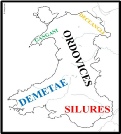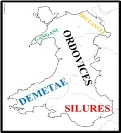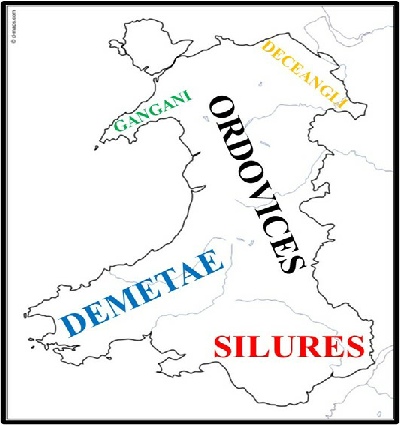43 (CE) Roman Conquest of Prydain (Britain)
Prydain was populated by Celtic tribes of Ancient Britons - in the land now known as Cymru (Wales), the five main tribes were the Gangani, Deceangli, Ordovices, Demetae and Silures.

48 - 78 Roman Conquest of Cymru
In 48, with the submission of the Deceangli of the north-east to the Romans, but it took until 78 for them to complete their conquest of the country when they finally captured Ynys Môn. The Silures in the south-east put up a particularly strong defence against them, which involved defeating a Roman legion in 52.
The Romans had identified the great mineral wealth of Cymru and began extracting large amounts of copper, lead and gold, as well as other metals. Most of what remains from the Roman settlement is military in nature: the country was controlled by Roman Legions based at Deva Victrix (Chester) and Isca Augusta (Caerleon), and they set up a network of auxiliary forts throughout Cymru, linked by straight roads.
Moridunum (Caerfyrddin) and Venta Silurum (Caerwent) were the only two administrative and economic towns (or civitates) in the country - they were the capitals of the Demetae and Silures, respectively. Outside the forts in the southern coastal region, however, trade and commerce flourished in smaller settlements called vici, and Roman villas have been discovered throughout the area.
Segontium (Caernarfon) was the main Roman fort in the north; it controlled the copper mines on Ynys Môn and defended the northern coast from attacks from Irish raiders. In the countryside, away from the military bases, rural life was largely unaffected by the presence of the Romans, however.
c.350 Irish Settlement
Roman influence became weaker and weaker and, by the middle of the 4th century, a number of Irish tribes began to settle in the western parts of Cymru.
383 End of Roman Era in Cymru
Macsen Wledig (Magnus Maximus) withdrew Roman military and political support from the country in 383 and this led to a dramatic increase in the settlement of Irish tribes. It has been suggested that Macsen had organised for Cunedda to travel from Yr Hen Ogledd (the Old North) to deal with the Irish invaders.



